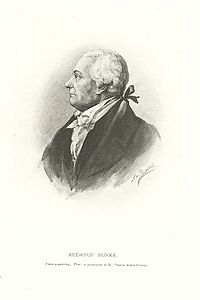
Aedanus Burke
Encyclopedia

South Carolina
South Carolina is a state in the Deep South of the United States that borders Georgia to the south, North Carolina to the north, and the Atlantic Ocean to the east. Originally part of the Province of Carolina, the Province of South Carolina was one of the 13 colonies that declared independence...
. Born in Galway, Ireland, he attended the theological college at Saint-Omer
Saint-Omer
Saint-Omer , a commune and sub-prefecture of the Pas-de-Calais department west-northwest of Lille on the railway to Calais. The town is named after Saint Audomar, who brought Christianity to the area....
, France, visited the West Indies, and immigrated to the American Colonies, settling in Charles Town, South Carolina
Charleston, South Carolina
Charleston is the second largest city in the U.S. state of South Carolina. It was made the county seat of Charleston County in 1901 when Charleston County was founded. The city's original name was Charles Towne in 1670, and it moved to its present location from a location on the west bank of the...
(now Charleston.) He served in the militia forces of South Carolina during the American Revolutionary War
American Revolutionary War
The American Revolutionary War , the American War of Independence, or simply the Revolutionary War, began as a war between the Kingdom of Great Britain and thirteen British colonies in North America, and ended in a global war between several European great powers.The war was the result of the...
and was appointed a judge of the State circuit court
Circuit court
Circuit court is the name of court systems in several common law jurisdictions.-History:King Henry II instituted the custom of having judges ride around the countryside each year to hear appeals, rather than forcing everyone to bring their appeals to London...
in 1778, serving until the enemy overran the state. He was a member of the South Carolina House of Representatives
South Carolina House of Representatives
The South Carolina House of Representatives is the lower house of the South Carolina General Assembly, the upper house being the South Carolina Senate. It consists of 124 Representatives elected to two year terms at the same time as US Congressional elections...
from 1779 to 1778, and again served in the Revolutionary Army from 1780 to 1782.
When the courts were reestablished, Burke resumed his seat on the bench, and in 1785 was appointed one of three commissioners to prepare a digest of the State laws. He was a member of the convention in 1788 called to consider ratification of the Constitution of the United States, which he opposed; he was elected as an Anti-Administration
Anti-Administration Party (United States)
Anti-Administration "Party" was the informal faction comprising the opponents of the policies of Treasury Secretary Alexander Hamilton in the first term of President George Washington. This was not an organized political party but an unorganized faction...
candidate to the First United States Congress (March 4, 1789 – March 3, 1791). He declined to be a candidate for reelection in 1790 to the Second Congress, the legislature having passed a law prohibiting a State judge from leaving the State; he was elected a chancellor
Chancellor
Chancellor is the title of various official positions in the governments of many nations. The original chancellors were the Cancellarii of Roman courts of justice—ushers who sat at the cancelli or lattice work screens of a basilica or law court, which separated the judge and counsel from the...
of the courts of equity
Court of equity
A chancery court, equity court or court of equity is a court that is authorized to apply principles of equity, as opposed to law, to cases brought before it.These courts began with petitions to the Lord Chancellor of England...
in 1799 and served until his death in Charleston in 1802. As the senior member of the South Carolina appellate courts from 1796 to 1799, Burke was the Chief Justice of South Carolina. Interment was in the cemetery of the Chapel of Ease of St. Bartholomew's Parish, near Jacksonboro, South Carolina.

